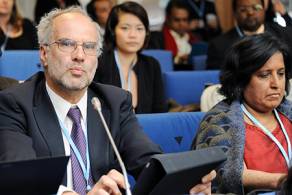
“The success of a new UN long-term agreement will depend on stepping up investment and catalyzing innovation in mitigation technologies and adaptation frameworks.” This was the message delivered by Nick Campbell (Arkema), speaking for business and industry groups attending the most recent negotiating meeting of the UN climate agreement, held last week in Bonn, Germany.
According to Norine Kennedy, USCIB’s vice president for strategic international engagement, environment and energy, also attending the Bonn talks, these global talks provide an opportunity to frame a new flexible, durable and cost-effective agreement on climate change.
“The world has evolved since the Kyoto Protocol was agreed,” Kennedy said. “The new climate agreement should encompass and reflect new science, technology, energy and economic situations, and it will have to involve all major emitting countries. Business is looking for a regime that protects the planet, works in synergy with international open markets and trade and safeguards investments in research and innovation.”

USCIB has worked closely with the International Chamber of Commerce, the Major Economies Business Forum and other business groups – representing a wide range of industries, in both developed and developing countries – to advocate the critical importance of creating enabling conditions to mobilize and leverage private-sector investment and innovation to address climate change and advance energy security and access.
Governments have announced their intention to conclude a new agreement for the post-2020 period within the next two years. A UN climate summit will take place on the sidelines of the 2014 UN General Assembly, and negotiating text is slated to be tabled by March 2015.
In Bonn, governments shared ideas on what might be in the new agreement. Tensions surrounded the challenging goals of gaining universal participation, developing acceptable national targets to achieve very ambitious global outcomes, and mobilizing significant funding to assist developing nations to mitigate their emissions and adapt to climate change.
Besides the implications of emissions mitigation and competitiveness concerns, business issues at stake in the negotiation include new policies to drive technological deployment and investment and potential new market mechanisms.
Under a U.S. government proposal, country-by-country pledges commitments could be submitted six months before the 2015 deadline, giving some time for a non-binding review to strengthen plans. Developing countries continue to call for a “top-down” target for emissions reduction and financial commitments.
USCIB’s Environment Committee, chaired by Ann Condon (GE), will begin preparations for the next round of UN negotiations to be held in June, with a focus on providing U.S business views on key elements of the international regime, and highlighting the need for positive conditions for development, commercialization and deployment of technology and know-how.
Staff contact: Norine Kennedy





